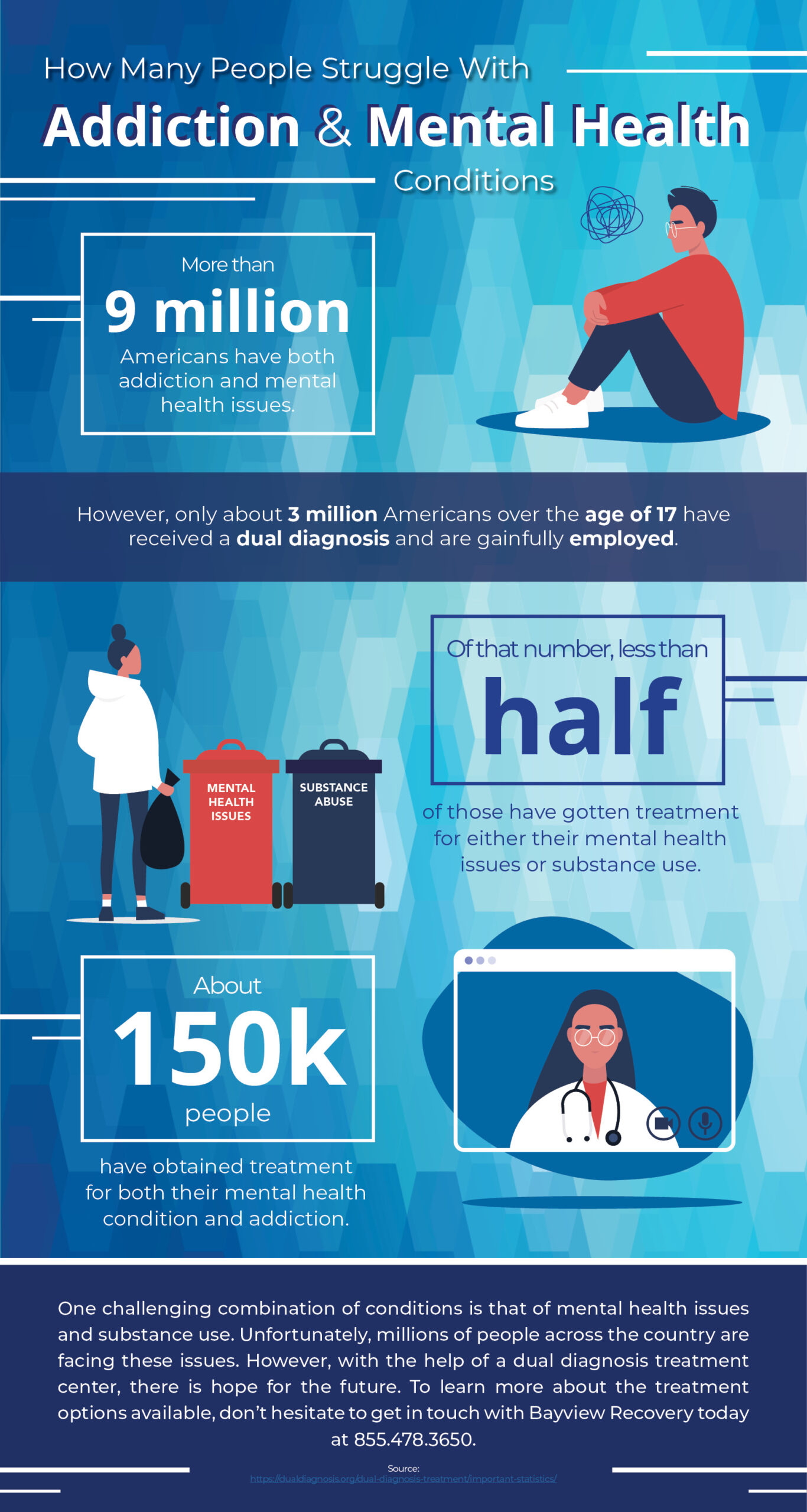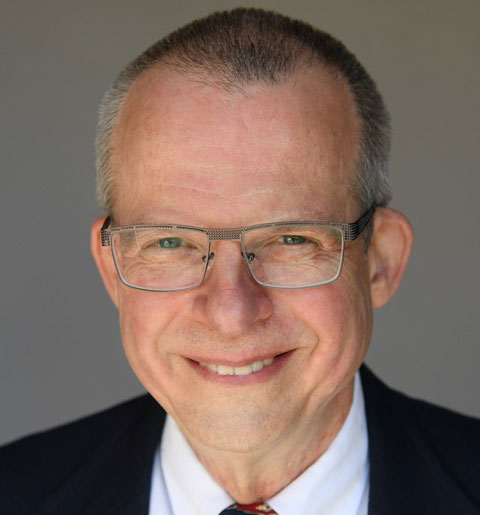Dual Diagnosis Treatment in Tacoma, Washington
Research shows that over 9 million people in the United States are struggling with both mental illness and addiction. A dual diagnosis treatment center is a rehab specializing in the identification of co-occurring disorders along with an individual’s substance abuse problem. This additional disorder is always a mental health disorder. This is important as they can be catalysts of an individual’s substance use or the product of it. Additionally, ongoing substance use can raise previously dormant mental health problems.
The necessity of seeking treatment for both disorders may seem daunting. Most comprehensive and qualified rehab programs offer clients many resources designed to help them deal with this confluence of concerns. Those who are seeking a mental health treatment center in Washington can find hope here at our facility.
At Bayview Recovery, our dual diagnosis treatment programs give clients the resources and support to face these problems directly. They enable clients to heal and provide them with many strategies and practices for their long-term recovery and well-being. Please reach out to our dual diagnosis treatment team today to learn more about our services.

Understanding Dual Diagnosis Treatment Centers
A substance abuse disorder is a complex problem that often has many drivers. These include genetic factors, past trauma, or currently stressful problems. A primary driver of substance use disorders is mental health illness. Individuals may use drugs or alcohol as a way to treat their troubling or painful symptoms. Of course, the ongoing use of substances inevitably leads to additional problems. For some individuals, underlying mental health issues begin to present issues as a result of substance use.
Mental health issues can have many traumatic symptoms. These include sadness, despair, hallucinations, mood swings, and suicidal ideation. However, people with co-occurring disorders can receive treatment, end their dependency, manage their symptoms, and regain long-term health and well-being.
To achieve this positive outcome, clients with these needs must have a course of treatment that includes drug rehab and clinical therapy by counselors qualified in the treatment of drug or alcohol addiction with a co-occurring mental disorder.
If you’ve been searching for dual diagnosis treatment centers in Washington State, we can help you. At Bayview Recovery, our substance abuse treatment programs are uniquely tailored to each individual and their circumstances.
We address co-occurring disorders with compassion and understanding, seeking to treat the “whole person” rather than just one issue.
What Is Dual Diagnosis Treatment?
Dual diagnosis treatment became a recognized form of helping individuals heal from substance abuse and mental health disorders in the 1990s. Previously, medical professionals would treat these disorders separately and often require clients to achieve sobriety before seeking other forms of treatment. Because of this requirement, many individuals did not get the treatment they needed for their mental health conditions, and any treatment they received for their substance abuse problems would often become undermined by their untreated co-occurring disorder.
However, once the medical community began to acknowledge the impact that one disorder could have on another, doctors began to recognize the value to patients of treating both illnesses together. This has given hope to countless individuals as well as the opportunity to overcome both issues with long-term success.
Therefore, as we treat mental health disorders, we can also treat a range of substance use disorders, including:
Alcohol
Heroin
Cocaine
Opioids
Meth

If you’re looking for addiction and mental health treatment services, please contact Bayview Recovery today.
Types of Co-Occurring Disorders
An addiction you can’t break free from can be a cause of great despair. If you also have a mental health condition — whether it has caused your addiction or been produced by it — this can increase your feelings of hopelessness. You may feel like you will never break free or be healthy again. Everyone thinks that, but first, talk to some of Bayview Recovery’s alumni.
You will not get better on your own, but you can get better with help. Bayview Recovery can help. We’ve already helped thousands overcome addiction and the mental health issues that often coincide.
Therapy can help identify the root causes of behavioral health issues and facilitate healing and recovery.
Dual diagnosis treatment is individualized to address the individual needs of the client and the personal circumstances of their substance use. There isn’t a one-size-fits-all approach to dual diagnosis treatment, nor should there be.
The level of care each client will receive is primarily dictated by the length and severity of the issues they’re facing, how much support they will need, and how long they will need to recover. For instance, at Bayview Recovery, we offer a range of treatment options.
Some of the main conditions that co-occur with substance abuse include the following:
Depression is one of the most common mental disorders today. Symptoms of this mental health condition may include:
- Feelings of sadness, hopelessness, and general malcontent
- Avoiding your friends and family
- Disinterest in your former hobbies
- Changes in appetite and sleeping patterns
- Mysterious aches and pains with no apparent cause
Our dual diagnosis treatment program can help those who are dealing with substance abuse and depression. Mood disorders such as depression can be addressed here at our Washington treatment center. If you are searching for depression treatment centers in Washington State, reach out to us here at Bayview Recovery.
Anxiety treatment is another common reason that our patients require dual diagnosis treatment. Benzodiazepines and other prescription drugs can significantly hamper anxiety symptoms, but they’re also highly addictive. We offer a range of anxiety treatment options.
Our program for anxiety treatment in Tacoma can help those who suffer from dual diagnoses. We are committed to providing the best care to those who are working to overcome co-occurring disorders.
Obsessive-compulsive disorder (OCD) is a condition characterized by obsessions and compulsions. When people have obsessive-compulsive disorder, this condition can affect their lives in many negative ways.
Obsessions are images, thoughts, and impulses that occur over and over. They are often uncontrollable and even illogical. Compulsions are repetitive thoughts or behaviors that people may use to help their obsessions go away. For example, if a person with OCD has an extreme fear of germs or disease (obsession), the individual may wash their hands or apply hand sanitizer excessively (compulsion).
Bayview Recovery offers dual diagnosis treatment services to help those suffering from OCD and substance abuse.
Attention deficit hyperactivity disorder (ADHD) is a mental health disorder that most people associate with childhood, but it can continue into adulthood. Many people with ADHD have troubled relationships, low self-esteem, and struggle at work or school. However, ADHD treatment can help to manage these symptoms in the future. However, ADHD treatment centers such as ours here at Bayview Recovery can help those living with co-occurring mental and behavioral health disorders.
Bipolar disorder is a mental health issue that often co-occurs with addiction. In some cases, the person’s substance use can lead to this condition, but in other cases, patients may use substances to manage their condition. Symptoms of this condition vary from person to person, and many people receive the wrong diagnosis because their symptoms are similar to those of depression or other mental illnesses. Symptoms of this mental health disorder include:
- Drastic mood swings between depressive episodes and manic episodes
- An exaggerated sense of wellbeing and self-confidence
- Poor decision making
- Depressed mood
- Decreased ability to concentrate and think clearly
Treatment for mood disorders can help patients understand their condition and give them the tools to cope. Our facility offers a treatment program for dual diagnoses, treating co-occurring disorders such as addiction and bipolar disorder. Call us to learn more about our bipolar disorder rehab today.
Schizophrenia is a condition that impacts how an individual feels, thinks, and acts. Many of those who suffer from this condition are unable to keep in touch with reality. They may turn to substances to cope with their mental disorders. Schizophrenia treatment can help them learn to manage their symptoms without drugs or alcohol.
Treatment centers for schizophrenia such as Bayview Recovery are here to help those suffering from co-occurring disorders.
Individuals who suffer from personality disorders have behaviors, feelings, and thought patterns that differ from what may be considered “normal”. Typically, personality disorders negatively affect the way people function, control their behaviors, relate to others, think about themselves, and emotionally respond.
There are 10 types of personality disorders, including borderline personality disorder, narcissistic personality disorder, antisocial personality disorder, and more. These disorders can cause relationship issues and prevent people from understanding other points of view, leading to family and friendship problems.
However, our dual diagnosis treatment center offers personality disorder treatment for those suffering from co-occurring substance abuse and personality disorders. So, those seeking dual diagnosis treatment centers in Washington State can find the hope they need right here.
Seeking Dual Diagnosis Services in Tacoma, WA?
Bayview Recovery’s qualified addiction specialists estimate each person’s needs as best as they can during the intake process. However, it is not uncommon for people to need more or less time depending on how well they respond to treatment.
Also, medications can help control specific mental health symptoms. They can significantly improve the quality of an individual’s recovery. They also affect the length of their stay by increasing the effectiveness of the other treatments they will receive. Medications may be an ongoing part of their recovery. However, the primary value of a dual diagnosis treatment center derives from the strategies and techniques individuals will learn to manage their mental health and sobriety on an ongoing basis.

The Importance of Finding a Dual Diagnosis Treatment Center
Mental health disorders and addiction are illnesses that can be treated and managed. Untreated mental illnesses can have a substantial, negative impact on substance abuse. It is imperative that any individual who has a dual diagnosis seek immediate professional medical and therapeutic treatment.
These co-occurring disorders are also a prime risk factor for relapse. Even if an individual seeks help for a substance abuse problem, treating both disorders in a single, comprehensive course of treatment during rehab can provide individuals with significant relief from their symptoms. It also improves mental and physical health and strategies to maintain their sobriety.
Reach Out to Bayview Recovery Today
Bayview Recovery, located in Tacoma, Washington, offers comprehensive and proven treatment. Even for individuals who have been diagnosed with a co-occurring disorder. We rely on evidence-based techniques for all types of substance abuse issues. We offer dual diagnosis treatment programs such as:
- Partial hospitalization program (PHP) for addiction
- Intensive outpatient program (IOP) for addiction
- Outpatient addiction treatment program
- Medication-assisted treatment (MAT)
Our therapy services include the following:
- Family therapy
- Individual therapy
- Group therapy
- Trauma and somatic therapy
- Dialectical behavior therapy (DBT)
- Cognitive behavioral therapy (CBT)
- Meditation, mindfulness, and yoga
- Holistic treatments
In addition, our facility offers a safe and comfortable environment designed wholly around the recovery needs of our clients. Those who need drug or alcohol addiction treatment can find hope and healing here at Bayview Recovery. Our services also help clients develop relapse prevention skills.
Mental illness and addiction no longer have to control your life or the lives of the ones you love. You can regain control by beginning your addiction treatment at Bayview Recovery today.
If you’re suffering from drug or alcohol addiction and mental or emotional disorder problems, let our treatment program help you; contact us today.

What our Clients are Saying?
“The staff at the center has been remarkable in their care for our loved one. Tuni was with us the whole way as we tried to get this person into treatment. They continue to assist us as the process continues. Great work!”
Ray O
“I have been trying to get sober the past 3 years and I have been to treatment 5 times. Bayview Recovery was my 6th time. They helped me get to 142 days sober! I was a handful hot mess when I got there but the team never gave up on me. They work with families and they truly care about them too. Bayview house’s are clean and comfortable and the staff is amazing. They plan for fun events weekly and they want you to have fun. If your looking for something different call them it will save your LIFE!”
Cindy J
“Bayview is dedicated to providing clients the healthiest environment to develop a solid foundation in their recovery. The therapists and medical team are devoted to ensure clients have the best individualized care. I highly recommend Bayview for anyone seeking a highly professional treatment program. The care and compassion given to clients is remarkable.”
Robin M
“This is a fantastic facility with outstanding staff. If you or a loved one is struggling this is a great program to start the journey of recovery and get life long skills and relationships to begin a new life!”
Garrett T
“Just picked up our daughter after 90 days at Bayview Recovery. Loved the staff and facility, do not know what the future holds ???????? but while at Bayview , always felt informed. Highly recommend, incredibly helpful especially at the very beginning when we were so helpless and needed help the most – God Bless.”
Rosie S
Looking for Dual Diagnosis Treatment in Tacoma, WA?
Bayview Recovery, located in Tacoma, Washington, specializes in addiction recovery and has helped thousands of adult men and women safely navigate their way through addiction and back to sobriety. We are an addiction treatment and recovery center that treats substance abuse and co-occurring disorders.
Take a Look at Our Blogs
Despite their seemingly harmless appearance and widespread popularity, the dangers…
Have you noticed your partner or loved one's drinking habits…
Dave Cundiff, MD, MPH is an experienced leader in the field of Substance Use Disorder treatment. He works with patients suffering from Substance Use Disorder to evaluate their medication needs and prescribe treatments accordingly. In addition, he regularly participates in all-staff debriefing sessions involving peers, nurses, and other prescribers. He also reviews and advises on policies, procedures, and techniques for treating substance use disorder.










